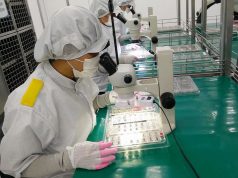House panel approves TRAIN 2, hopes to dampen inflation impact
A HOUSE COMMITTEE approved in principle a bill covering the second package of the tax reform program, though its chairman signalled that he will rule out any proposals that would aggravate inflation.
Meanwhile, Senate President Vicente C. Sotto III on Thursday filed the chamber’s version of the tax reform package, going into the books as Senate Bill No. 1906 or the proposed Corporate Income Tax and Incentives Reform Act, with Mr. Sotto saying that his priority is aiding micro, small and medium enterprises (MSMEs).
The House committee also constituted a technical working group tasked to consolidate House Bill (HB) 7458, Corporate Income Tax and Incentives Reform Act, with other bills seeking to reduce corporate income tax (CIT) while rationalizing fiscal incentives.
“Can we at least agree that we will, as we do the substitute bill, cut down on items that will contribute or aggravate the rising inflation,” Ways and Means Committee Chair Dakila Carlo E. Cua said.
The bill, authored by Mr. Cua, Representatives Raneo E. Abu, and Aurelio D. Gonzales, proposed to lower the CIT rate from 30% to 20%, reducing the rate by one percentage point annually; while streamlining grant of fiscal incentives.
The Department of Finance (DoF) only wants to go as far as lowering the CIT to 25% and proceed with the lowering by percentage points a year on condition that additional revenue to be raised equals 0.15% of gross domestic product (GDP). The DoF proposal is embodied in HB 7214, authored by Reps. Horacio P. Suansing, Jr. and Estrellita B. Suansing.
“The objective is to increase investment and jobs. That’s the bottom line of what we’re trying to work on,” Mr. Cua told reporters in an interview.
“We need to streamline investment schemes to be more responsive, targeted and transparent,” he added.
He did not specify a timeline for the drafting of a substitute bill.
“We are trying to finish as early as possible without compromising the quality of the legislation,” he said.
“It’s very important to exert all efforts to make this non-contributory to the rising inflation. In fact, we will try to write it so it decreases inflation. That’s a little ambitious, but at least what we want to achieve is no increase in inflation,” Mr. Cua said.
The second tax reform package seeks to remove redundant tax incentives which the DoF estimates cost the government some P178.56 billion in potential revenue in 2016.
The government also proposes to replace the existing 5% gross income earned tax incentives in lieu of all other taxes, with a 15% tax on net income.
Incentives to be retained will be those in line with the Strategic Investment Priority Plan (SIPP), and the system will be managed by the Fiscal Incentives Review Board.
Also on Thursday, committee vice chair Jose Ma. Clemente S. Salceda urged the DoF to consider introducing a provision creating an adjustment fund in the proposed measure to assist workers likely to be affected by the law.
Mr. Salceda said during the fifth deliberation session for the House Bills: “It makes sense to make a contingency (fund) and it should be built within the law.”
In response, Finance Undersecretary Karl Kendrick Chua said “I can suggest in other clauses that such a fund be created.”
Deputy Speaker Sharon S. Garin raised concerns about the DoF’s removal of the 10% special rate incentive granted to the education and health sectors, should they fail to meet certain criteria.
“We want to keep the incentives, but we also want the schools to improve,” Mr. Chua said.
Ms. Garin, however, argued that performance of educational institutions is determined by several factors.
“Its a mix of (many) variables, we cannot just go into the numbers,” Ms. Garin said, adding that performance of a school should be the concern of government agencies such as the Department of Education and the Commission on Higher Education.
“That’s the job of DepEd and CHEd. I think that’s more of their concern. (It cannot be corrected by) slashing what were giving them,” Ms. Garin added.
“My version of TRAIN 2. My focus is on lowering corporate income tax of micro, small and medium enterprises (MSMEs) from 30% to 25%,” Mr. Sotto said in a text message to BusinessWorld.
In his explanatory note, Mr. Sotto said the government needs to lower the corporate income tax for the 915,000 registered corporations.
He said the 123 special laws on tax incentives should be repealed and instead be consolidated into a single omnibus incentives list provided in the bill.
It would also repeal exemptions under the National Internal Revenue Code on government-owned and controlled corporations (GOCC), educational institutions and hospitals, regional or area headquarters (RHQs), regional operating headquarters (ROHQs), income of resident foreign corporations from foreign currency transactions, nonresident cinematographic film owners, lessors or distributors and owners or lessors of vessels, aircraft, machineries and other equipment.
He also clarified that “the existing investment tax incentives shall not be removed, but it will be rationalized,” noting that some 654 firms enjoyed incentives from the government over the past 20 to 30 years.
“Thus, it is high time to have a tax incentives system that is performance-based, targeted, transparent and time-bound in order to ensure that the Filipino people will gain from every peso that the government gives to the firms registered in the investment promotion agencies (IPAs),” he said.
Mr. Sotto assured that the bill “will not have any inflationary effects” but will provide support to 90,000 MSMEs with the proposed lowered corporate income tax.
The bill also provides higher penalties for tax offenders, he added.
Mr. Sotto earlier said he was inclined to support the second package of the tax reform program after learning from the Department of Finance (DoF) that the proposed measure would help MSMEs.
Once filed, he also had hoped the issue will spur further discussions in the Senate. — Charmaine A. Tadalan and Camille A. Aguinaldo




